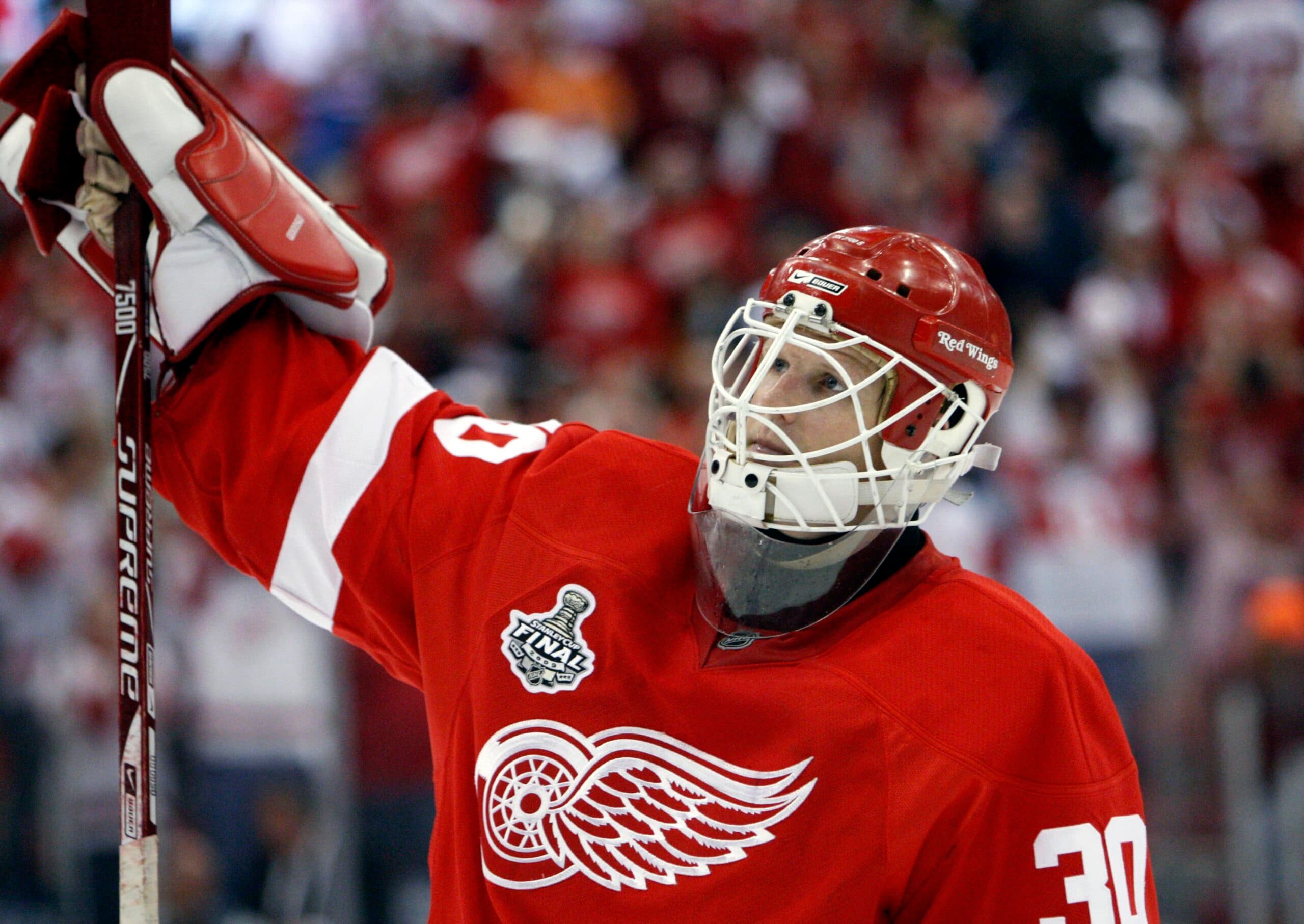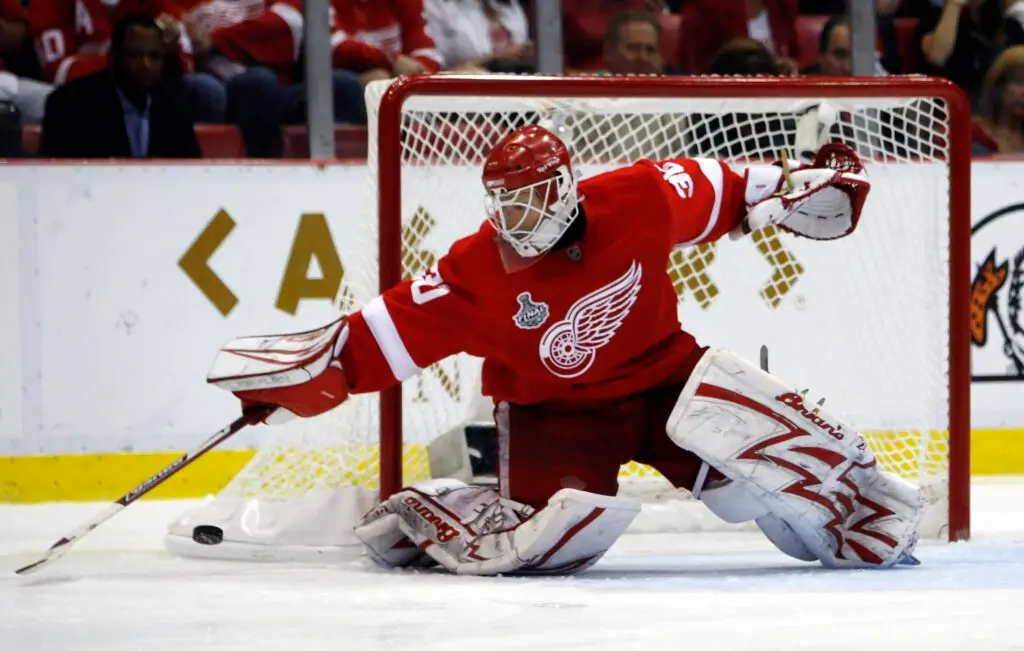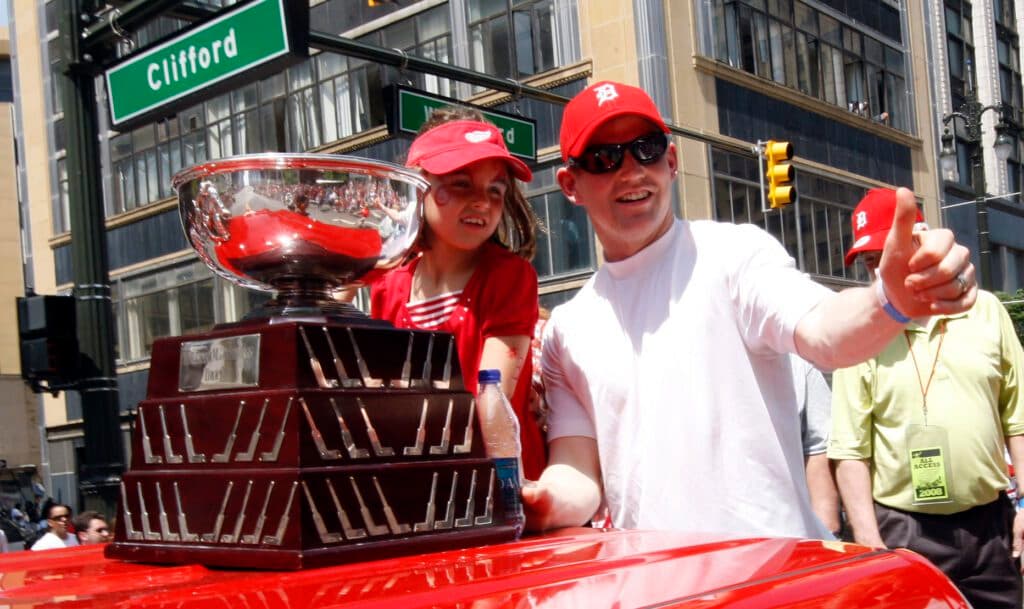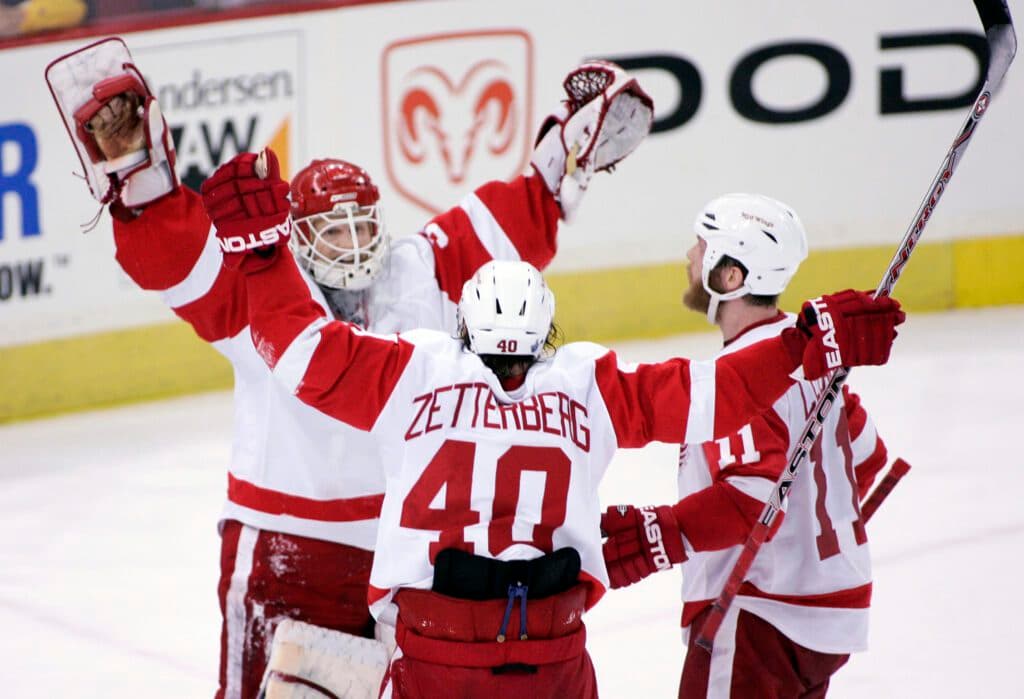Chris Osgood deserves to be in the Hall of Fame

Of all the attributes Ken Holland used to describe what made Chris Osgood great, two words stand out above all else.
“He won.”
For 17 years, Christopher John Osgood did a lot of winning. Whether it be with the Detroit Red Wings, New York Islanders or St. Louis Blues, the man known as “Ozzy” had achieved a lot of success, especially in the playoffs.
In a 17-year career, Osgood went under the radar, despite having numbers that are among the best to ever play the game. Yet, he has yet to be inducted into the Hockey Hall of Fame.
It’s time for that to change.
Osgood burst onto the scene as a rookie during the 1993-94 season, leading the Red Wings to the best record in the old Campbell Conference, finishing fifth in Calder Trophy voting in the process.
However, after a stunning loss to the upstart San Jose Sharks in the first round, Detroit decided to bring in a proven winner in Mike Vernon. The two quickly became one of the best tandems in the league. While Vernon helped lead Detroit to the Stanley Cup Final in 1995, Ozzy had better numbers.
The following season, the Peace River, Alb. native stepped into the spotlight. He led the league with 39 wins, helping the Red Wings reach a then-record 62 victories. Along with being named an all-star for the first time in his career, Ozzy, along with Vernon, claimed the Jennings Trophy for the fewest goals allowed in a season. Osgood infamously finished second to Jim Carey in Vezina voting that season, despite having better numbers in seemingly every statistic.

Longtime teammate and friend Kris Draper acknowledges that Osgood’s confidence came to the forefront during that record-breaking campaign, especially when he earned the trust of legendary head coach Scotty Bowman.
“When you have the greatest coach in the history of the game,” Draper explained. “All of a sudden, he keeps tapping you to go out and play and play for a team that is setting records, obviously, you’re going to gain a lot of confidence. I think that’s exactly what Ozzy did that year.”
Even though Osgood played more games, won more games, and arguably played better than his fellow netminder, he was still seen as an afterthought since he wasn’t the big-time playoff performer, especially since Bowman went with Vernon during the 1997 postseason. He ended up beating Roy and the Colorado Avalanche, claiming the Conn Smythe Trophy as a result.
That narrative changed not long after…
Why should he be in the Hall?
Playoff success
Ozzy is statistically one of the best of all time in the postseason. He ranks ninth all-time with 74 postseason victories. Not even Hall of Famers Dominik Hasek, Henrik Lundqvist or Tom Barrasso have reached 70. Outside of Fleury, all 10 NHL backstops who have 70 playoff victories are in the Hall. Osgood also has 15 shutouts in the playoffs, placing him tied for fifth all-time.
Of goaltenders who have played in over 100 playoff games, Osgood ranks third in goals-against average (2.09) – better than Roy, Lundqvist, and Belfour – and ninth in save percentage (.916) – better than Dryden, Hall, and Fleury.
He never missed the playoffs, either. Even when he went to Long Island prior to the 2001-02 season, he dragged a young Islanders team to its first postseason berth in eight years. Yes, they lost to the much stronger Toronto Maple Leafs team, but it took the Leafs seven games (and Darcy Tucker clipping Michael Peca) to advance.
His numbers only tell a small part of Osgood’s postseason aura. Everyone remembers captain Steve Yzerman’s famous goal against the Blues in Game 7 of the 1996 playoffs. The final score of that game? 1-0. Why? Chris Osgood, that’s why. Regardless of the situation, Osgood would find a way to reach down and pull out a signature performance. Just ask the guys who played with him.
“He’s a killer competitor,” Grind Line member Darren McCarty said. “If you had one game, life or death, Ozzy’s my goalie. I don’t trust any other goalie…When it’s time to shut it down, and you need a big save, he’s the guy.”
“He still kind of has that little boyish look,” Draper explains. “But I’ll tell you what, he had that competitive fire. You just have to have that burning passion and that competitive fire that burns within and the belief in yourself. I think Ozzie kind of felt the bigger the game, the better that he could play.”
When you ask those who played with and against Osgood, his most redeeming quality wasn’t his athletic brilliance or his knowledge of the game. Instead, it was his ability to rebound after a bad game or goal against.
Former Red Wings TV host John Keating, who was alongside Osgood on broadcasts for 10 years and worked in Denver when the Avs won the Cup in 1996, saw how Osgood was able to welcome the pressure.
“Nothing bothered him,” Keating said. “Nobody cared more than he did, but if something didn’t go particularly well, he was moving on. He was looking to the next game, to the next shift, to the next period.”
“He just had short-term memory,” former Wings and current Los Angeles Kings general manager Ken Holland said. “He played his best hockey when the games were the biggest. … I think that he was comfortable dealing with that pressure.”
His ability to come up big in the postseason made him a legend in the Motor City. After the Wings traded Vernon to the Sharks after winning the Cup, many wondered if Detroit could win with Ozzy in net. He gave up three “soft” goals in each of the first three rounds of the 1998 playoffs, but managed to bounce back every time.
Osgood followed up the infamous Jamie Langenbrunner goal from center ice in Game 5 of the Western Conference final with a shutout against the Presidents’ Trophy-winning Dallas Stars to send the Wings back to the championship series.
Draper admits that run is what truly etched Osgood’s name into Red Wings lore.
“You talk about the pressure and the adversity that we were facing as an organization. It takes obviously a pretty special goaltender to step up and be able to do that by replacing the Conn Smythe winner, and then obviously the tragedy that we went through in the summertime [Vladimir Konstantinov’s car accident], it shows the mental toughness that Ozzy has there.”
Osgood and the Red Wings swept the Washington Capitals, giving him a championship as a starter. 10 years later, he would do it again…
A very select group
Osgood played in two separate eras of the NHL. How he was able to adjust his game to the new-age style of butterfly goaltending when returning to Detroit following the 2004-05 work stoppage was something very few goaltenders managed to do.
Holland, who was a mentor to Osgood during his early years as a pro, recognizes the difficult transition he had to make to stay relevant in the game.
“Ozzy played a certain style, more of the traditional stand-up, go down when you have to,” Holland said. “The game was evolving. The position was evolving. He spent basically the entire winter refining the way he was playing his position. He changed his game in order to still be successful.”
After two years in a supporting role, Osgood stepped back into a more shared role with Hasek in 2007-08. The seasoned duo ended up being the league’s best tandem, winning the Jennings Trophy while Ozzy posted a league-leading 2.09 GAA.

Despite Hasek getting the call in Game 1 of the playoffs, Osgood was asked to right the ship with their first-round series against the Nashville Predators tied 2-2. The Presidents’ Trophy-winning Wings never looked back. No. 30 led the team to nine straight wins to get to the conference final, before ultimately upending Sidney Crosby and the rising Pittsburgh Penguins in the Cup Final, giving Ozzy his third championship.
The win not only gave Osgood another ring, but it also made him the first starting goaltender to win a Stanley Cup pre- and post-lockout. The only other netminder to have won championships on both sides of the 2004-05 work stoppage was Hasek, who led Detroit to a championship in 2002 before backing up Ozzy in 2008.
401
“My personal opinion,” Holland stated. “If you win 400-plus games in the National Hockey League, I think he should be in the Hall of Fame.”
There have been 15 goaltenders to have won 400 games in the NHL. Osgood ended up with 401. Of the other 14 goaltenders, only four aren’t in the Hall of Fame. Sergei Bobrovsky and Jonathan Quick are still playing and Fleury isn’t eligible. Only Curtis Joseph, who ranks seventh all-time with 454 wins, is the only other Hall of Fame-eligible netminder to not be enshrined on Front Street (more on him another time).
“That’s an unbelievable accomplishment in terms of durability,” Keating said. “Finding your way onto the ice and into the lineup on a regular basis. That should be the only number that matters.”
Why isn’t he in yet?
The superstar era of goaltending
Simply look at the two eras he played in. His entire career was in the shadow of Brodeur, with Roy, Hasek and Ed Belfour. After the lockout, it was Fleury, Lundqvist and Ryan Miller who stepped into the spotlight.
Keating admits it was hard for him to stand out during arguably the greatest era of goaltending in modern times.
“He didn’t play with a particular degree of flash,” Keating said. “He wasn’t Dominik Hasek. He was playing very well. The perception is that he was sort of a journeyman goalie who was blessed to be on a really good team, but he played really well, and [Detroit] won because of the way that Chris Osgood played.”
Outside of 1996, Ozzy never came close to winning the Vezina, which many believe has been a knock on his career.
No Conn Smythe
In the two championships he won (as a starter) with the Wings, Osgood wasn’t recognized as the best player in the playoffs. In 1998, the Conn Smythe Trophy was awarded to Yzerman, who led the playoffs with 24 points. A decade later, Henrik Zetterberg, who was credited with the game-winning goal in Game 6 against the Pens, took home the honor.
To this day, I believe that had the Red Wings won the Cup in Game 5 in ’08, and pulled it out in Game 7 the following year, Osgood would’ve been named playoff MVP. However, Maxime Talbot had to ruin it all. In 2008, it was Talbot who scored the tying goal late in the third to send the fifth game to overtime, which Pittsburgh went on to win. Then, in the do-or-die game in 2009, Talbot’s two goals helped the Pens win their first Cup in 17 years.

In both of those years, Osgood was the best backstop in the playoffs, posting a ridiculous 1.55 GAA and .930 SV% in 2008, with a 2.01 GAA and .926 SV% in 2009.
“He played behind a great team”
The laziest, lamest and saddest excuse for keeping Osgood out of the Hall of Fame is that he played behind such amazing teams that they probably didn’t even need a goalie to begin with. That’s nothing further from the truth. To think that Osgood was simply along for the ride in Detroit is erroneous.
“Many of the other goalies of his era also played on good teams,” Holland admitted. “Detroit wasn’t the only good team. … It’s not like he had some advantage that some of these other goalies didn’t have. Even if you’re on a good team, you still have to make the big save at the right time, and you’ve got to have the mental strength and understand that’s your role. Some people have a hard time with that role.”
Do you think that many of the goaltenders I previously mentioned played behind complete bums? I believe Scott Stevens, Ken Daneyko and Scott Niedermayer played pretty well in front of Brodeur. Roy had so many great d-men in Colorado (Bourque, Blake, Foote, DeVries, etc.). Fuhr? He only played behind the team of the ’80s.
“You just keep going down the list,” Draper stated. “These Hall of Fame goaltenders, for the most part, these guys are playing behind obviously very good teams if you’re going to win Stanley Cups.”
McCarty says that if goaltenders were judged based on the teams they were on…hardly any goaltenders would be in the Hall.
“If the Hockey Hall of Fame’s criteria was, if you played behind a good team, then you were not eligible, because we’re not talking about numbers or wins, or Cups or anything like that. We’re talking about the fact of who you played for. So, in saying that, if they were consistent and there wasn’t anybody in the Hall of Fame that has a lesser resume than Chris Osgood…There’s guys in there that don’t stand up to Chris Osgood.”
Every great goaltender that has been inducted into the HHOF has played behind a stellar team at one time or another. Osgood might’ve played behind some of the best to ever lace up their skates, but they wouldn’t have been successful had it not been for him between the pipes.
“It’s tough to elevate your game to the greatness around you,” Keating said. “Ozzy was able to do that. I think they learned and they had confidence in Ozzy. I mean, obviously having Nick Lidstrom in front of you certainly helps your goaltender, but that doesn’t preclude the way that he played and the games that he won and the saves that he made.”
In Conclusion
Whether it be the statistics, the comparison to other goaltenders of his generation, or the amount of success he had in his storied career, there’s very little argument for keeping Osgood out of the Hall of Fame. Now, I know it can be hard for goaltenders to scratch their name into the Hall. Heck, it took Vernon until he was 60 years old to be inducted. That said, it seems only a matter of time before Osgood gets to be placed among his peers in Toronto for eternity.
“What else do you need?” McCarty pondered. “Is it cause he looks like he’s 12, so you don’t think he should? You should go by how much he’s appreciated by his teammates. He evolved his game. He played in different generations. The end of his career is as impressive as the beginning.”
“He did his job and above,” Holland replied. “You have to have good goaltending, and you have to have elite goaltending at the right time, or you don’t do as much winning as we did, especially in the playoffs.”
“He was always a guy that people would always overlook,” Draper said. “There were always superstars that we had ahead of him, but the one thing that we always knew was that if we didn’t play well defensively, getting solid goaltending, we weren’t going to win. And that’s still the recipe that you see in every Stanley Cup champion: you need your goaltender to be good.
“The bottom line is what Ozzy did is…when he was on his game, he gave us an incredible opportunity to win.”
SPONSORED BY bet365